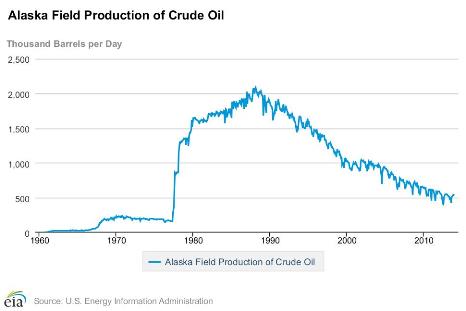Alaska has long been one of the United States’ largest producers of oil; it currently ranks fourth in oil production, with about 542,000 barrels per day. But the state has experienced a general decline in production since 1990, when it peaked at around 2 million barrels per day.
 
Less oil means fewer dollars coming into state coffers, which presents a serious threat to the state’s fiscal outlook. In an attempt to arrest the decline in oil production, Alaska’s legislature, governor, and representatives in Congress have aggressively supported offshore oil drilling in the Chukchi and Beaufort seas, which hold an estimated 29 billion barrels of oil.
But Royal Dutch Shell’s failed Arctic campaign has doomed those hopes for now. Shell cancelled drilling plans for 2014 and hinted that it may not return next year. With new CEO Ben van Beurden’s decision to steer the company away from so-called “elephant projects,†the Arctic is seemingly not a priority.
In response, Alaska has decided to take a much more active role in buoying its production of oil and gas. On April 20, the state legislature passed a law that to allow Juneau to directly invest in a natural gas pipeline and LNG export facility. The state plans to invest in 25 percent of the project, which includes an 800-mile pipeline that would connect to an LNG export terminal. The infrastructure would eventually allow for 16 to 18 million tonnes of LNG export capacity.
Gov. Parnell hailed the action as “a historic moment for Alaskans.â€
“By passing Senate Bill 138, the legislature has put Alaska on a path to controlling her own destiny by becoming an owner in the Alaska LNG Project,†he said.
The move was remarkable because if Alaska indeed makes such an investment, it would mark the hailed a U.S. state has taken such an enormous position in an oil and gas project.
Government ownership of oil and gas projects is common around the world – globally, state-owned companies own more than 90 percent of global oil reserves and 75 percent of production. But in the U.S., state legislatures, particularly those controlled by Republicans, are keen to protect free-market principles and keep government out of business.

